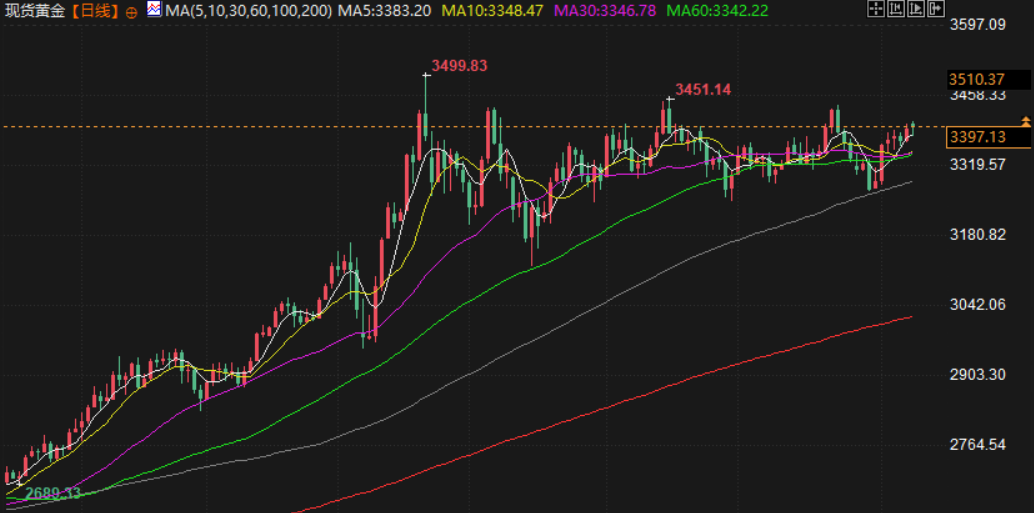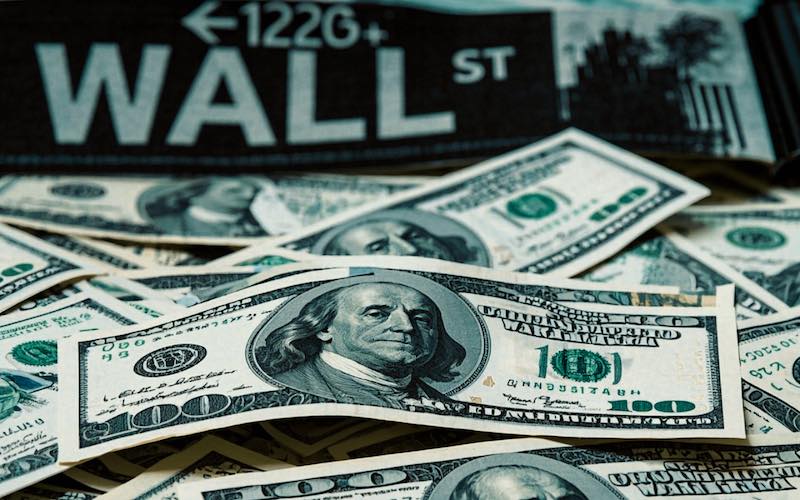Swiss refiners suspend exports to the US; the depreciation of the US dollar and the impact of tariffs may help push gold prices above $3,500
2025-08-09 06:35:30

Earlier, information released on the U.S. Customs and Border Protection (CBP) website indicated that Washington may impose country-specific import tariffs on gold bars, the most widely traded commodity in the U.S. December U.S. gold futures were steady at $3,454.1, having earlier hit a record high of $3,534.10.
"Gold's panic-fuelled rally shows that even safe-haven assets are not immune to the volatility sparked by the chaos of the tariff era," said Susannah Streeter, head of currencies and markets at Hargreaves Lansdown.
The gap between U.S. gold futures and spot gold prices widened to $57, having earlier reached over $100. Spot gold was steady at $3,396.8 an ounce, but was up 1% this week.
UBS noted that if tariffs persist, it expects the premium of New York gold prices over London prices to widen further, and arbitrage opportunities between other smelting centers will also increase.
The United States imposes a 39% import tariff on Swiss goods, and Switzerland is continuing negotiations with the United States to reduce the tariffs.
Some gold refiners, including a major Swiss entity, have suspended shipments of gold bars to the United States due to uncertainty, according to two people familiar with the matter. Gold bars exported from Switzerland, the world's largest gold refining center, previously entered the United States duty-free. But in a July 31 ruling at the request of a Swiss refinery subsidiary, U.S. Customs and Border Protection stated that the bars would now be subject to President Trump's reciprocal tariffs, which were then 10% imposed on Switzerland. As of Thursday, that tariff had soared to 39%.
“The imposition of tariffs on these minted gold products makes the export of these products to the United States economically unviable, thereby eliminating any future trade deficit resulting from gold exports,” the Swiss Association of Precious Metal Manufacturers and Traders said in a statement.
The association, which represents manufacturers and traders in the Swiss precious metals industry, said it remained committed to a “constructive” dialogue with U.S. authorities and international partners.
Switzerland’s State Secretariat for Economic Affairs declined to comment, saying discussions with the United States were ongoing and their goal had always been to reduce tariffs.
One-kilogram gold bars are the most common form of precious metal traded on the New York Mercantile Exchange. UBS strategist Joni Teves said the global gold market relies on futures traded on the New York Mercantile Exchange to hedge positions, assuming that precious metals can be easily imported into U.S. warehouses to settle contracts if necessary.
Gold prices also rose on concerns about the global economic outlook after Trump's new tariffs took effect Thursday and weak U.S. data prompted bets that the Federal Reserve would soon cut interest rates. Traders currently see an 89.4% probability of the Fed lowering its benchmark interest rate by 25 basis points in September, according to CME Group's FedWatch tool.
Meanwhile, Trump nominated Stephen Milan to temporarily fill a vacancy on the Federal Reserve Board, a move seen by the market as a possible shift by the central bank to a more accommodative monetary policy stance.
Milan has also been a harsh critic of the Federal Reserve's policy implementation since the 2008-09 financial crisis, arguing that the Fed has too frequently blurred the lines between fiscal and monetary policy. Milan, who has criticized the "revolving door" between the executive branch and the Fed, co-authored a report for the Manhattan Institute last year in which he proposed addressing what he sees as a range of Fed ills, from "herd mentality" in monetary policy to excessive regulation, a lack of accountability, and a lack of focus on its core mission: fighting inflation. He wrote that to regain the benefits of the Fed's independence from political control, that independence must end.
Federal Reserve Board members serve 14-year terms and cannot be removed once appointed. Milan believes this should be changed to shorten board member terms to eight years, with the president being able to remove them at will. "We recommend shortening the terms of board members, making it clear that appointments are subject to the will of the president of the United States, and prohibiting the revolving door between the executive branch and the Federal Reserve." It is unclear whether Milan's proposal to change the Fed's current system will affect his chances of Senate confirmation.
If implemented, however, it would represent a significant shift for the Federal Reserve. The Fed's internal budget would be incorporated into congressional appropriations bills, serving as a tool for greater political oversight, and some functions beyond monetary policy would be split among different departments of the central bank. Milan proposes further disrupting the current structure, allowing all 12 regional Federal Reserve bank presidents to have permanent voting rights, rather than the current limit of just five governors. However, the regional Federal Reserve banks themselves would also face reforms, placing their boards under the authority of the governors. This system could create Republican-leaning or Democratic-leaning reserve banks in the United States' fractured electoral landscape. However, Milan believes this would strengthen the accountability of the Fed, which he believes has lost its way.
Stephen Miran is the architect of Trump's tariff policy, and the market interprets his appointment as a sign of looser monetary policy. The prospect of further Fed rate cuts could boost the appeal of gold, a non-interest-bearing precious metal.
Strategists at State Street Investments said in a report that the resilience of gold prices may be pointing to hidden market risks. Despite the stock market recovery since April and the decline in asset market volatility, the precious metal has only fallen 3%-4% from its record high. They said that the price of gold bars may have formed a new baseline above $3,000 an ounce. Further depreciation of the US dollar may support gold's rise to the bull case scenario envisioned by these strategists, which is $3,500-3,900 an ounce. Other key macro factors for the precious metal include Federal Reserve policy and US trade negotiations. "The risks still seem to be tilted towards higher rather than lower gold prices before the end of the year," they said.
Geopolitical tensions limited gold's gains. U.S. President Trump posted on TruthSocial: "The much-anticipated meeting between myself, the President of the United States, and Russian President Vladimir Putin will take place in the great state of Alaska on Friday, August 15, 2025. More details will follow."
Next week, gold prices will focus on the meeting between Trump and Putin, as well as speeches by several Federal Reserve officials on the economic outlook.

- Risk Warning and Disclaimer
- The market involves risk, and trading may not be suitable for all investors. This article is for reference only and does not constitute personal investment advice, nor does it take into account certain users’ specific investment objectives, financial situation, or other needs. Any investment decisions made based on this information are at your own risk.





















